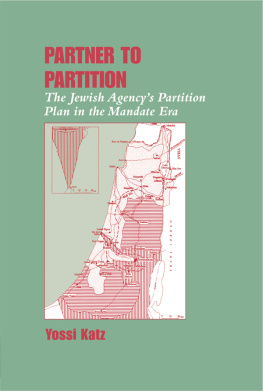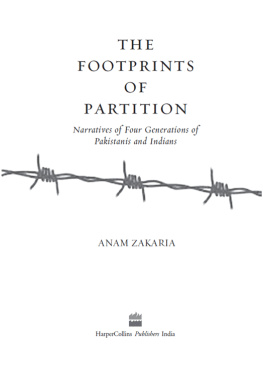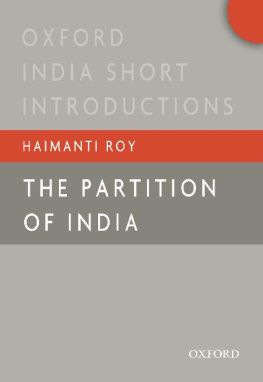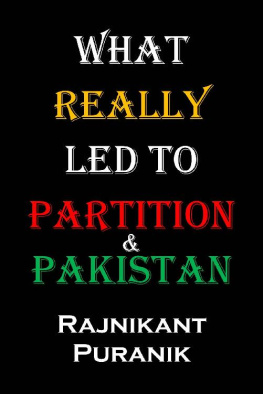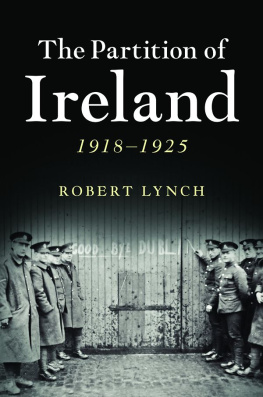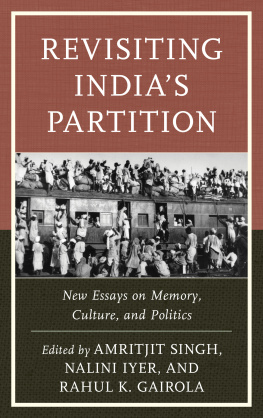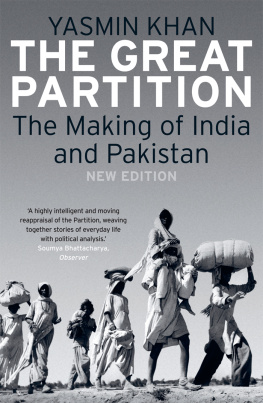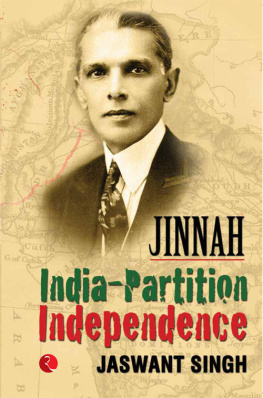PARTNER TO PARTITION
PARTNER TO PARTITION
The Jewish Agency's Partition Plan
in the Mandate Era
YOSSI KATZ
Department of Geography,
Bar-Ilan University,
First Published in 1998 in Great Britain by
Routledge
2 Park Square, Milton Park, Abingdon, Oxon, OX14 4RN
270 Madison Ave, New York NY 10016
Transferred to Digital Printing 2006
Website http://www.routledge.com
Copyright 1998 Yossi Katz
British Library Cataloguing in Publication Data:
Katz, Yossi
Partner to partition : the Jewish Agency's partition plan in the mandate era
1. Jewish Agency 2. Palestine History Proposed partition, 1937
I. Title
956.9404
ISBN 0-7146-4846-9 (cloth) 0-7146-4401-3 (paper)
Library of Congress Cataloging-in-Publication Data:
Katz, Yossi.
Partner to partition: the Jewish Agency's partition plan in the mandate era/Yossi Katz.
p. cm.
Includes bibliographical references and index.
ISBN 0-7146-4846-9 (cloth). ISBN 0-7146-4401-3 (paper)
1. Palestine-History-Proposed partition, 1937. 2. Jewish Agency for Palestine-History. 3. Zionism-Palestine-History. I. Title.
DS126.K38 1998
| 956.9404-dc21 | 97-28250 CIP r97 |
All rights reserved. No part of this publication may be reproduced, stored in a retrieval system, transmitted or utilized in any form or by any means, electronic, mechanical, photocopying, recording or otherwise, without the prior permission of Frank Cass Publishers.
Typeset by Vitaset, Paddock Wood
Publisher's Note
The publisher has gone to great lengths to ensure the
quality of this reprint but points out that some
imperfections in the original may be apparent
Cover illustration: Proposal of Jewish
Agency Executive for the partition of
Palestine, 1938
Printed and bound by CPI Antony Rowe, Eastbourne
To my son Avichai on the occasion
of his upcoming Bar-Mitzva
Contents
Postscript or Prelude?
The Jewish Agency's Partition Plan An Episode or a
Portent?
The Arab-Israeli dispute features prominently in Palestine's political history during the modern era, and attempts to solve it have continued for many years. A solution to the conflict based on partitioning the country into two nations has enjoyed currency. The partition idea emerged already in the 1930s and a number of plans were formulated to solve the dispute in such a fashion.1 In fact, the partition of Palestine was on the verge of implementation only ten years later, when the United Nations General Assembly decided, in late 1947, to establish a Jewish and an Arab state.2 However, the United Nations Plan was not realized. The cease-fire lines established following the 1948 War were those that divided Palestine between the newly arisen State of Israel and its Arab neighbors: a new Arab state did not arise in Palestine itself.3 This reality was to prevail until the Six Day War in 1967. Following that war, Israel assumed control of all areas of Palestine and this situation obtained until implementation was begun in 1994 on the Declaration of Principles between Israel and the Palestinians.
By the close of the 1930s plans for partitioning Palestine were already being awarded scholarly scrutiny, primarily by historians and researchers in the fields of international relations and political science. Special attention was devoted to the partition plan of 1937, which was elaborated by the British Royal Commission headed by Lord Peel. The reverberations that this plan touched off among the various parties connected to the dispute have also enjoyed scholarly interest. International bodies had already advanced plans for solving the Palestine problem via partition prior to the appearance of the Royal Commission's plan.4 However, there is no doubt that the momentum behind solving the JewishArab dispute via partition began gathering once the plan was advanced by this Commission. Most historical research on the contemporary Near East and Palestine, and the JewishArab conflict makes reference to the Royal Commission's plan. However, the research literature that centers on the Royal Commission's plan its formulation, the reverberations it touched off, the discussions on it until the plan was dropped from the political agenda at the close of 1938 has been subsumed under two frameworks. The first views the plan in the context of an overall examination of British policy and activity in Palestine during Britain's mandatory rule.5 The second focuses on the polemics and bitter debate that the plan set off within Palestine's Jewish community and within the Zionist Movement over the moral dilemma whether one should assent to the partition of Palestine, west of the Jordan, in return for obtaining a sovereign state.6 Very little attention has been devoted towards examining the partition plan of 1937 in a comparative context together with other partitions that took place throughout the world during the 1920s.7
This book seeks to examine an additional aspect of the Palestine partition plan issue prior to the Second World War, which has not yet been awarded serious attention, namely the operative plans that the Jewish Agency Executive formulated in anticipation of partition. These plans were consonant with the Executive's current policy of supporting partition in return for getting a state. The Jewish Agency Executive was the central body within the network of Jewish national institutions. It was accredited as the representative of Palestinian Jews and enjoyed formal status vis--vis Britain and the League of Nations under the award of the mandate.8 As it emerges, the Agency did not adopt a do-nothing policy while passively awaiting the implementation of the British Partition Plan. The reverse is true. The Executive, a majority of whose membership endorsed the idea of partition in principle in return for obtaining a sovereign state took an active line. On the basis of the British Partition Plan advanced by the Royal Commission, or more aptly as a response to this plan, the Executive undertook the task of formulating its own basic partition plan between the years 193738. This, so it appears, was the first partition plan to be formulated at the initiative of an official Zionist body. The issue of boundaries, which is the central component of any partition scheme, formed the core of this plan, but it also encompassed additional elements, such as the status of Jerusalem and other cities, transfer of population, the status of the Arab minority in the Jewish state, the stages leading to the establishment of a Jewish State and more. The Jewish Agency entered into negotiations with the authorized British bodies on most components of its plan. This work will also attempt to demonstrate that the partition plan of the Agency Executive, even though it was not implemented, did not remain a mere episode from the Jewish standpoint but had both short-term and long-term repercussions. In the immediate term, it affected the direction of settlement policy, while in the long term it exerted an impact on various elements connected to the partition of Palestine in the late 1940s, and on the first steps taken by the fledgling State of Israel.
The study of political partition the world over tends to view it as an amalgam of developmental stages, commencing with the pre-partition stage, continuing through the conflict leading to partition, partition itself, the separate development of the political units created in the wake of partition, the development of a normal framework of relations between the two political units, until the option of reunification of the two units becomes feasible.9 Within this framework, our work will concentrate on the initial component of the partition stage itself: the stage when the formulation of an operative plan for partition crystallizes. However, this book does not devote its primary attention to the forces that were to implement partition (Britain and the League of Nations), but intends to focus and examine one of the forces expected to create and construct a political unit following partition (the Jewish Agency Executive). This force believed that it could influence the decisive power (Britain) when the latter elaborated an operative plan for partition, and for this reason it worked on formulating a plan of its own. Nonetheless, since the Jewish Agency Plan was composed on the basis of the anterior British Royal Commission Plan, we must first examine this plan and the responses which it elicited at the British political level and at the level of the League of Nations.

